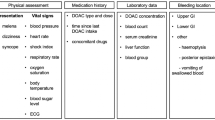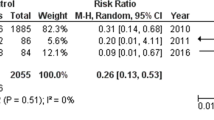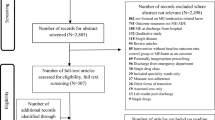Abstract
Acid-suppressive therapy (AST) is largely prescribed in both hospital and general practice setting but few data are available on appropriateness of AST use in hospitalized patients and its fallout on prescribing in general practice. We assessed AST in patients consecutively admitted to an internal medicine department to determine the type and timing of prescription and indication for use according to widely accepted guidelines. Prescriptions were rated as indicated, acceptable, or not indicated. Overall, 58.7% of 834 admitted patients received AST, mainly proton pump inhibitors. The prescriptions were indicated in 50.1% of patients, not indicated in 41.5%, and acceptable in 6.5%. The main reason for inappropriate use was prophylaxis in low-risk patients (64.8%). On admission, 35.7% of 112 patients already on AST were judged to receive inappropriate prescription; of 348 patients discharged on AST, overuse was identified in 38.5%. No significant difference was observed for inappropriate use at admission, during hospitalization, and at discharge. In 64 inpatients (7.7%) AST, although indicated, mainly for ulcer prophylaxis in high-risk patients, was not prescribed. In conclusion, AST is substantially overused in both hospital and general practice settings, mainly for ulcer prophylaxis in low-risk patients. On the other hand, AST is underused in a small, but not negligible proportion of high-risk patients.
Similar content being viewed by others
References
Nardino RJ, Vender RJ, Herbert PN: Overuse of acid-suppressive therapy in hospitalized patients. Am J Gastroenterol 95:3118–3122, 2000
Parente F, Cucino C, Gallus S, Bargiggia S, Greco S, Pastore L, Bianchi Porro G: Hospital use of acid-suppressive medications and its fall-out on prescribing in general practice: a 1-month survey. Aliment Pharmacol Ther 17:1503–1506, 2003
Jacobson BC, Ferris TG, Shea TL, Mahlis EM, Lee TH, Wang TC: Who is using chronic acid suppression therapy and why? Am J Gastroenterol 98:51–58, 2003
Boutet R, Wilcock M, MacKenzie I: Survey on repeat prescribing for acid suppression drugs in primary care in Cornwall and the Isles of Scilly. Aliment Pharmacol Ther 13:813–817, 1999
Goudie BM, McKenzie PE, Cipriano J, Griffin EM, Murray FE: Repeat prescribing of ulcer healing drugs in general practice. Prevalence and underlying diagnosis. Aliment Pharmacol Ther 10:147–150, 1996
Ryder SD, O'Reilly S, Miller RJ, Ross J, Jacyna MR, Levi AJ: Long term acid suppressing treatment in general practice. BMJ 308:827–830, 1994
Gullotta R, Ferraris L, Cortelezzi C, Minoli G, Prada A, Comin U, Rocca F, Ferrara A, Curzio M: Are we correctly using the inhibitors of gastric acid secretion and cytoprotective drugs? Results of a multicentre study. Ital J Gatroenterol Hepatol 29:325–329, 1997
Strid H, Simren M, Bjornsson ES: Overuse of acid suppressant drugs in patients with chronic renal failure. Nephrol Dial Transplant 18:570–575, 2003
Sebastian SS, Kernan N, Qasim A, O'Morain CA, Buckley M: Appropriateness of gastric anti-secretory therapy in hospital practice. Ir J Med Sci 172:115–117, 2003
Il primo rapporto nazionale sull'uso dei farmaci in Italia nel I semestre 2000. Boll Inform Farm 1/8:42–43, 2001
Valori RM, Brown CM, Strangeways P, Bradburn M: Reducing community dyspepsia drug costs: a controlled trial. Gut 49:495–501, 2001
Katz PO, Tutuian R: Histamin receptor antagonists, proton pump inhibitors and their combination in the treatment of gastro-esophageal reflux disease. Best Pract Res Clin Gastroenterol 15:371–384, 2001
Soo S, Moayyedi P, Deeks J, Delaney B, Innes M, Forman D: Pharmacological interventions for non-ulcer dyspepsia. Cochrane Database Syst Rev (2) CD001960, 2000
Howden WC, Leontiadis GI: Current indications for acid suppressants in Helicobacter pylori negative ulcer disease. Best Pract Res Clin Gastroenterol 15:401–412, 2001
Soll AH: Consensus Conference. Medical treatment of peptic ulcer disease. Practice guidelines. JAMA 275:622–629, 1996
Dubois RW, Melmed GY, Henning JM, Laine L: Guidelines for the appropriate use of non steroidal anti-inflammatory drugs, cyclo-oxygenase 2-specific inhibitors and proton pump inhibitors in patients requiring chronic anti-inflammatory therapy. Aliment Pharmacol Ther 19:197–208, 2004
Lau JY, Sung JJ, Lee KK, Yung MY, Wong SK, Wu JC, Chan FK, Ng EK, You JH, Lee CW, Chan AC, Chung SC: Effect of intravenous omeprazole on recurrent bleeding after endoscopy treatment of bleeding peptic ulcers. N Engl J Med 343:310–316, 2000
Naunton M, Peterson GM, Bleasel MD: Overuse of proton pump inhibitors. J Clin Pharm Ther 25:333–340, 2000
Niklasson A, Bajor A, Bergendal L, Simren M, Strid H, Bjornsson E: Overuse of acid suppressive therapy in hospitalized patients with pulmonary diseases. Respir Med 97:1143–1150, 2003
Sherman DS, Avorn J, Campion EW: Cimetidine use in nursing homes: prolonged therapy and excessive doses. J Am Geriatr Soc 35:1023–1027, 1987
Yeomans ND, Tulassay Z, Juhasz L, Racz I, Howard JM, van Rensburg CJ, Swannell AJ, Hawkey CJ: A comparison of omeprazole with ranitidine for ulcers associated with non-steroidal antiinflammatory drugs. Acid Suppression Trial: Ranitidine versus Omeprazole for NSAID-associated Ulcer Treatment (ASTRONAUT) Study Group. N Engl J Med 338:719–726, 1998
Silverstein FE, Graham DY, Senior JR, Davies HW, Struthers BJ, Bittman RM, Geis GS: Misoprostol reduces serious gastrointestinal complications in patients with rheumatoid arthritis receiving non-steroidal anti-inflammatory drugs. A randomized, double-blind placebo-controlled trial. Ann Intern Med 123:241–249, 1995
Rostom A, Dube C, Wells G, Tugwell P, Welch V, Jolicoeur E, McGowan J: Prevention of NSAID-induced gastroduodenal ulcers. Cochrane Database Syst Rev (4):CD002296, 2002
Taha AS, Hudson N, Hawkey CJ, Swannell AJ, Trye PN, Cottrel J, Mann SG, Simon TJ, Sturrock RD, Russell RI: Famotidine for the prevention of gastric and duodenal ulcers caused by non-steroidal antiinflammatory drugs. N Engl J Med 334:1435–1439, 1996
Hudson N, Taha AS, Russell RI, Trye PN, Cottrel J, Mann SG, Swannell AJ, Sturrock RD, Hawkey CJ: Famotidine for healing and maintenance in nonsteroidal anti-inflammatory drug-associated gastroduodenal ulcerations. Gastroenterology 11:1817–1822, 1997
Aalykke C, Lauritsen K: Epidemiology of NSAID-related gastroduodenal mucosal injury. Best Pract Res Clin Gastroenterol 15:705–722, 2001
Conn HO, Blitzer BL: Nonassociation of adrenocorticosteroid therapy and peptic ulcer. N Engl J Med294:473–479, 1976
Piper JM, Ray WA, Daugherty JR, Griffin MR: Corticosteroid use and peptic ulcer disease: role of nonsteroidal anti-inflammatory drugs. Ann Intern Med 114:735–740, 1991
Conn HO, Poynard T: Corticosteroids and peptic ulcer: meta-analysis of adverse events during steroid therapy. J Intern Med 236:619–632, 1994
Shorr RI, Ray WA, Daugherty JR, Griffin MR: Concurrent use of nonsteroidal anti-inflammatory drugs and oral anticoagulants places elderly persons at high risk for hemorrhagic peptic ulcer disease. Arch Intern Med 153:1665–1670, 1993
Gutthann SP, Garcia Rodriguez LA, Raiford DS: Individual nonsteroidal anti-inflammatory drugs and others risk factors for upper gastrointestinal bleeding and perforation. Epidemiology 8:18–24, 1997
Petty GW, Brown RD, Whisnant JP, Sicks JD, O'Fallon WM, Wiebers DO: Frequency of major complications of aspirin, warfarin and intravenous heparin for secondary stroke prevention: a population-based study. Ann Intern Med 130:14–22, 1999
Smalley W, Stein CM, Arbogast G, Eisen J, Ray WA, Griffin GM: Underutilisation of gastroprotective measures in patients receiving nonsteroidal antiinflammatory drugs. Arth Rheum 46:2195–2200, 2002
Author information
Authors and Affiliations
Corresponding author
Rights and permissions
About this article
Cite this article
Scagliarini, R., Magnani, E., Praticò, A. et al. Inadequate Use of Acid-Suppressive Therapy in Hospitalized Patients and Its Implications for General Practice. Dig Dis Sci 50, 2307–2311 (2005). https://doi.org/10.1007/s10620-005-3052-4
Received:
Accepted:
Issue Date:
DOI: https://doi.org/10.1007/s10620-005-3052-4




